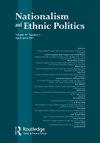Pan-German or Pan-Saxon? Framing Transylvanian-Saxon Particularism on Both Sides of the Atlantic
IF 1.1
Q3 ETHNIC STUDIES
引用次数: 0
Abstract
Abstract From the mid-19th century, Transylvanian Saxons were subject to attempts to frame their particularism within two overarching pan-nationalisms: pan-Germanism and pan-Saxonism. While both lacked support before the First World War, from the interwar period pan-Germanism become important in Transylvania and pan-Saxonism among the large Transylvanian-Saxon diaspora in America. This interwar success, despite the failure of both before the war, highlights pan-nationalisms’ contingency on shifting political landscapes and their utility to their supporters. Transylvanian Saxon expressions of pan-nationalisms were also highly flexible, legitimizing platforms from cultural exchange to something approaching political and territorial unification, to integrating Saxon diasporas into their new American and West German homelands. This flexibility is overlooked in the few studies of “generic” pan-nationalism that, frequently using Germany as a case study, tend to emphasize state unification and empire building. Saxon expressions of pan-nationalism were deeply rooted in Saxon particularist understandings of the communities they posited and shaped to meet their own needs.泛德意志还是泛撒克逊?在大西洋两岸构建特兰西瓦尼亚-撒克逊特殊主义
自19世纪中期以来,特兰西瓦尼亚撒克逊人一直试图将他们的特殊主义框定在两种主要的泛民族主义中:泛日耳曼主义和泛撒克逊主义。虽然在第一次世界大战之前两者都缺乏支持,但从两次世界大战之间的时期开始,泛日耳曼主义在特兰西瓦尼亚变得重要起来,而在美国的大批特兰西瓦尼亚-撒克逊移民中,泛萨克森主义变得重要起来。尽管战前两者都失败了,但这种两次世界大战之间的成功凸显了泛民族主义在不断变化的政治格局中的偶然性及其对支持者的效用。特兰西瓦尼亚撒克逊人对泛民族主义的表达也非常灵活,从文化交流到接近政治和领土统一,再到将撒克逊散居者融入他们新的美国和西德家园,这些都是合法化的平台。这种灵活性在少数对“一般”泛民族主义的研究中被忽视了,这些研究经常以德国为例,倾向于强调国家统一和帝国建设。撒克逊人对泛民族主义的表达深深植根于撒克逊人对他们为满足自己的需要而设想和塑造的社区的特殊主义理解。
本文章由计算机程序翻译,如有差异,请以英文原文为准。
求助全文
约1分钟内获得全文
求助全文
来源期刊

Nationalism and Ethnic Politics
ETHNIC STUDIES-
CiteScore
1.30
自引率
0.00%
发文量
30
期刊介绍:
Nationalism & Ethnic Politics explores the varied political aspects of nationalism and ethnicity in order to develop more constructive inter-group relations. The journal publishes case studies and comparative and theoretical analyses. It deals with pluralism, ethno-nationalism, irredentism, separatism, and related phenomena, and examines processes and theories of ethnic identity formation, mobilization, conflict and accommodation in the context of political development and "nation-building". The journal compares and contrasts state and community claims, and deal with such factors as citizenship, race, religion, economic development, immigration, language, and the international environment.
 求助内容:
求助内容: 应助结果提醒方式:
应助结果提醒方式:


